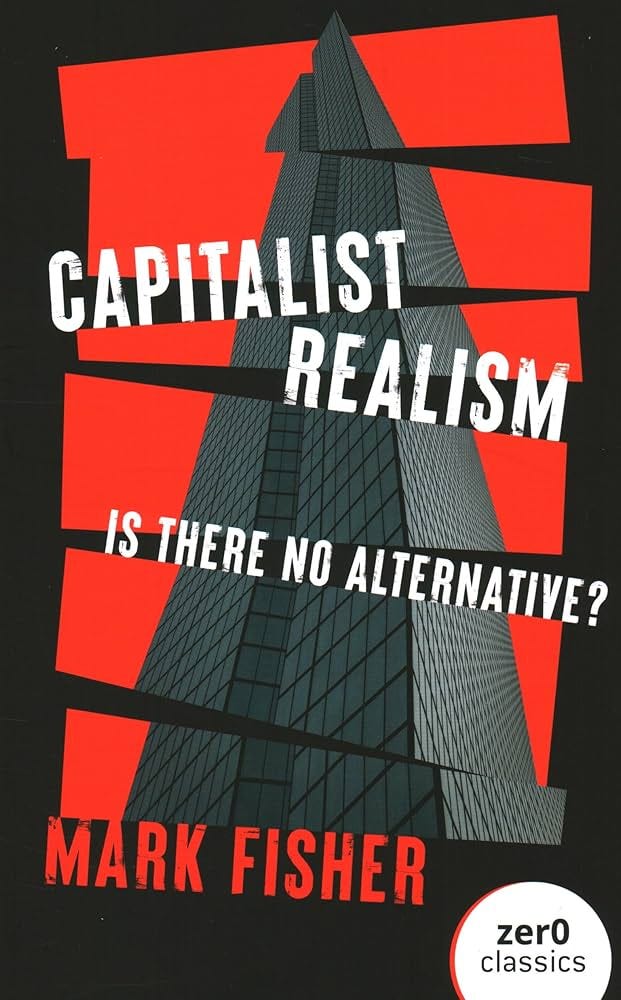Reading To Escape 'The Matrix'
Revelations from 'The Invisible Doctrine' and 'Capitalist Realism'.
At the start of this year I had something of an epiphany, which I wrote about in detail on my work blog under the title ‘Time for Some Ch-Ch-Changes’. Essentially, lots of talented friends were retrenched by vast companies that had been coasting on inflated pandemic profits having spent that time referring to their employees as "family" and obliging them to perform lockdown miracles.
Despite the fact that these companies made up most of my client base I came to realise that my motivation was helping the people that worked there; the fact that companies benefitted was a bonus. Hence, this year, I pivoted my business to try and help more people, in the form of creative freelancers, independent agencies, publishers and production companies, build more sustainable businesses to preserve their integrity and wellbeing. So far so good. But this epiphany sparked an interest in alternative economic systems that prioritise people over profiteering, which led me to two books I would like to share with you.
'The Invisible Doctrine: The Secret History of Neoliberalism (& How It Came to Control Your Life)'
By George Monbiot & Peter Hutchinson
This new, small and rather beautifully bound hardback is written by journalist and activist George Monbiot whom I have continued to read ever since giving up on the British broadsheet he works for many years ago. I think of him as a 'reasonable radical' i.e. he is a passionate climate and social justice activist but posits actionable solutions not just intractable problems. He's also a media innovator having incorporated music and art into his message, even presenting a live streamed investigative documentary on YouTube.
Monbiot's co-author, Peter Hutchinson, is described in the blurb as a filmmaker, author, educator and activist. His films include 'Requiem for the American Dream' featuring Noam Chomsky, 'Devil Put The Coal in the Ground', 'Healing from Hate' and 'The Cure for Hate'. (I have never seen any of them.)
Early in the book the authors are kind enough answer the key question: What is neoliberalism?
(Neoliberalism) is an ideology whose central belief is that competition is the defining feature of human kind. It tells us we are greedy and selfish, but that greed and selfishness light the path to social improvement, generating the wealth that will eventually enrich us all.
It casts us as consumers rather than citizens. It seeks to persuade us that our well-being is best realized not through political choice, but through economic choice - specifically, buying and selling. It promises us that by buying and selling we can discover a natural, meritocratic hierarchy of winners and losers.
So what's wrong with that? I am an entrepreneur and a salesman. I love to sell and build businesses, I literally help other people to do it. The difference is both the scale and the reductivism.
Neoliberalism, which has been around since the 1930s, reduces the whole world and everyone in it to nothing more than a marketplace where anything that doesn’t make a profit is valueless e.g. nature and communities. By way of an example, whilst working on a project for a climate fund last year, I was shocked to discover that according to current (neoliberal) economics, there exists no way to a value a living tree as worth more than a dead one. A dead tree can be sold by a logging firm to a lumber yard, who can sell it on to a construction company, paper mill or furniture maker, who sell it to a consumer generating multiple transactions along the way - what can a living tree do but stand there converting carbon dioxide to oxygen?
The goal of neoliberalism is to expand the accessible, addressable market by eradicating borders (via trading blocks), homogenizing cultures (via advertising) and influencing governments (via lobbying). This enables corporations sell more product at a lower cost to more people whilst paying less taxes and complying with less regulations, and of course all of this has been accelerated by the borderless Internet where “winners” take all e.g. Google, which commands 92% of the global search market. The upside may appear to be lower prices (if you don’t count the cost to personal and planetary wellbeing - which we don’t). The downside is that, as the market expands, so does your size of your competition i.e. whereas once you might have had to compete with similarly skilled people in your town, county, or even country, neoliberalism forces you to compete with the whole world for everything - jobs, housing, education, the lot.
Handily the Olympics is on right now so we can see first hand what it takes to compete at the global level - everything! Athletes sacrifice their entire lives, relationships, every waking hour and every calorie consumed to competing. The difference between them and us is that they have a choice. Neoliberalism offers no such choice. Neoliberalism demands that we play the game or die in poverty. Is it any wonder we’re all stressed out?!
Buy online at Bookstore.org in the UK and OpenTrolley.com.sg in SG.
Capitalist Realism: Is There No Alternative
By Mark Fisher
Mark Fisher was a music writer, theorist and academic who sadly passed away far too early in 2017. He wrote ‘Capitalist Realism’ in 2009 but I only discovered it recently whilst book shopping with a punk friend whom I used to go to gigs and get drunk with and now go to book shops and take tea with.
Shorter than ‘The Invisible Doctrine’ but with denser language infused from his academic career this book is something like the red pill that reveals the matrix! Discarding the Introduction and Afterword the bulk of the book is just 80 pages but mine are now covered in highlights and marginalia.
The opening chapter is named after a quote attributed to philosophers Fredric Jameson and Slavoj Žižek:
It’s easier to imagine the end of the world than the end of capitalism.
What they mean is that we are now so deeply entrenched in the mechanisms of capitalism we cannot conceive of an alternative except maybe the false binary of failed communism. Although released earlier, ‘Capitalist Realism’ builds on the theme from ‘The Invisible Doctrine’ that our well-being is best realized not through political choice, but through economic choice and cites Live Aid as an early example:
The original Live Aid concerts in 1985…insisted that 'caring individuals' could end famine directly without the need for any kind of political solution or systemic reorganisation.
In other words, the answer to the famine was to throw money at it because money must ALWAYS be the answer to every problem in capitalist reality.
Fisher reveals how corporations are complicit in keeping us compliant citing the number of Hollywood films made by giant, globe-spanning, tax-dodging companies wherein the bad guy is a big corporation just like them. Think of everything from Erin Brokovich to Robocop to Wall-e, I’ll wait…see? But why would these companies flagellate themselves in this way?
A film like Wall-E exemplifies what Robert Pfaller has called 'inter-passivity': the film performs our anti-capitalism for us, allowing us to continue to consume with impunity.
When corporations directly address the issues of their own corruption it relieves us, the audience, of the burden of having to do it so we can carry on with our lives.
Climate change and the threat of resource-depletion are not being repressed so much as incorporated into advertising and marketing.
As an academic Fisher writes with insider knowledge about how the education system has turned students into customers that become so indebted to lenders (often owned by hedge funds), that by the time they leave university they are effectively neutralised as potential change-agents because they have no choice but to join the system to pay off their debts. This same system has a castrating effect on teachers because they are now at the service of their paying customers, the students who, like all customers expect to be right even when they're not.
Fisher wonders aloud why the answer to increasing rates of depression, anxiety and ADHD he sees in the classroom always seems to be pharmaceutical rather that political or systemic…
Considering mental illness an individual chemico-behavioural problem has enormous benefits for capitalism. First, it reinforces Capital's drive towards atomistic individualisation (you are sick because of your brain chemistry). Second it provides an enormously lucrative market in which multinational pharmaceutical companies can peddle their pharmaceuticals (we can cure you with our SSRIs).
This book was released 15 years ago and it seems people have become more savvy since then. Certainly Gen Z are assumed to be more aware of their circumstances than previous generations, partly because 15 years of economic uncertainty and stagnation has locked them out of the system, forcing them to find alternative ways to live and build a life, at least for now.
Buy online at Bookstore.org in the UK and OpenTrolley.com.sg in SG.
Gen Z may have been involuntarily ‘freed’ from the system but what about those of us already ensconced in it, what can we do? Well, don’t lose sleep over it for a start. Capitalism has been the dominant organizing principal of Western society for up to 500 years depending on how you count it and it’s not on your shoulders to bring it down and, anyway, you’ve definitely benefited from aspects of it. But with the advent of the Internet and the financialisation of just about everything we have entered a new phase of capitalism, which is taking a tangible toll on both people and planet so simply start with yourself.
Look at your consumption, work out what you really need to be happy, put a figure on it and stop competing when you get there. Cultivate the ability to be content in your own company so that you don’t need to constantly consume and when you do, do it mindfully. Appreciate how fortunate you are to have the option to buy things at all and ensure those things are unique, of good quality and value not mass-produced and marked up by a giant corporation that is laughing all the way to the bank - remember, the average Dior handbag costs $57 to make but is sold to you for $2,800.
A Confession
By Neal Moore
I’m a bit of an audiophile. I’ve invested quite a lot of money into my stacking system and it gives me great pleasure when I play my records. But, because I spent so long researching the gear I am constantly served ads and content telling me that for the true audiophile experience, the ultimate audiophile experience what I really need is something newer, fancier and, inevitably, more expensive. But what am I trying to do really? I am trying to recreate the feeling my dad had listening to The Beatles for the first time in 1962, a moment which gave him such profound joy delivered through a plastic, Woolworths turntable with a built-in speaker. I am lucky, I have plenty, in fact I have more than enough.
Recommendations Without Explanations
Geoff Norcott’s Working Men’s Club - The award-winning comedian Geoff Norcott on the thing he knows most about; being a British bloke: https://www.bbc.co.uk/sounds/brand/m0020y3d
Esplanade Presents KAGAMI by Ryuichi Sakamoto and Tin Drum - A transcendental concert experience unlike any other by one of the world’s most celebrated contemporary composers: https://www.sistic.com.sg/events/kagami1024
Aghori Mhori Mei - A brand new album from grunge survivors Smashing Pumpkins:
See you next Sunday, Nx








